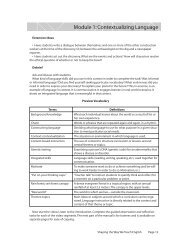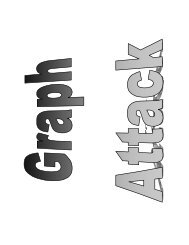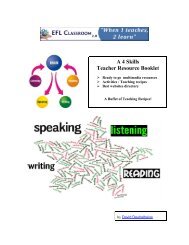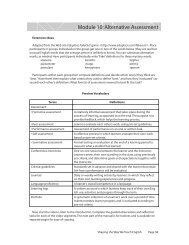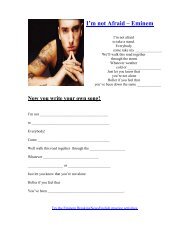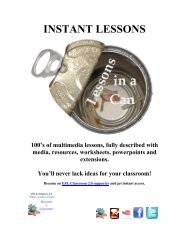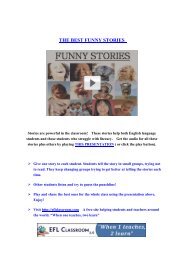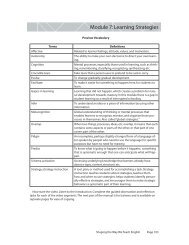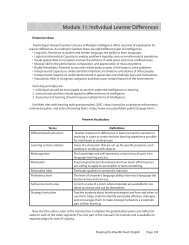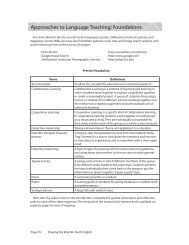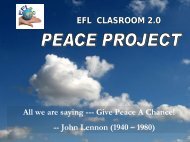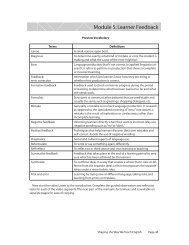Ten Audience Analysis Exercises - EFL Classroom 2.0
Ten Audience Analysis Exercises - EFL Classroom 2.0
Ten Audience Analysis Exercises - EFL Classroom 2.0
Create successful ePaper yourself
Turn your PDF publications into a flip-book with our unique Google optimized e-Paper software.
efore, you as a writer now, and the thing that influenced you to help me<br />
understand why this influence has been important.<br />
6. Describe yourself as a writer by using an analogy. Begin by completing this<br />
sentence: "As a writer, I am like a _______." Or this one: "When I write, it's like<br />
________________." For example, you might complete the sentence this way:<br />
"As a writer, I am like a gardener." After you've come up with your comparison,<br />
draft a paper that explores the analogy you've chosen. If I were comparing myself<br />
to a gardener, I'd compare the way that I get started on my papers to the way that I<br />
start work on a garden. You have to do two things in this paper--show how you<br />
write, and draw comparisons to help make the way you write clearer to your<br />
readers.<br />
7. What's your language background? What languages do you know? What have you<br />
studied? What is your family's language background? What language does the<br />
community you are a part of use? Think of your background as a crazy quilt or a<br />
collage. Write several short paragraphs describing what you know about language<br />
and how it works. Once you've drafted your parts, piece them together. You might<br />
connect the various pieces like a hypertext. You could use a very large piece of<br />
paper and create your own graphic organization, putting each piece in a bubble<br />
and creating connections with links.<br />
8. What are your earliest memories of reading and writing? Write a flashback. Jump<br />
in a time machine. What do you remember about reading and writing from when<br />
you were younger? Try to be as specific as you can--do you remember the titles of<br />
books you read? details about the plot? Do you remember a particular story that<br />
you wrote? What has made these items memorable? Why do you think these<br />
memories have stayed with you? How do they relate to the way you read and<br />
write now?<br />
9. How do you know when a paper is done? When you bake a cake, you can tell it's<br />
down by using a toothpick or tapping the top. When you're filling up your gas<br />
tank, you can tell you're done when the tank is filled to the top. How do you tell<br />
when something you're writing is done? Are there misleading things to look out<br />
for--can you be tricked into thinking something you're writing is done when it's<br />
not? Describe the process you would go through to test a paper, and tell us what<br />
you're looking for in your tests and how you decide whether it's passed--how you<br />
decide it you're finished.



